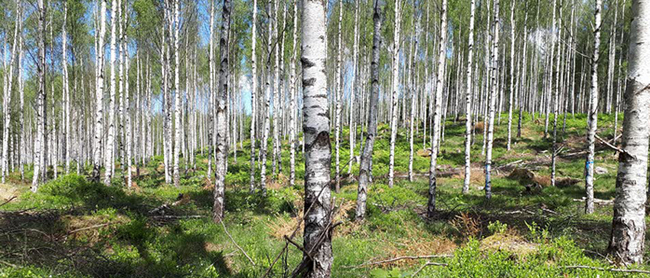Displaying items by tag: Linnaeus University
The potential of birch as high-quality material
A new dissertation from Linnaeus University looks at how we can improve Swedish birch wood properties through tree breeding, forest management and better measurement methods. Grace Jones, in the Department of Forestry and Wood Technology at Linnaeus University, has studied birch wood properties from genetics trials and a species mixture trial of spruce and birch. The hope is that this increased knowledge will make birch forests more popular and, as a result, inspire new products and areas of use.
Birch is our third most common tree species. However, only a fraction of the stems is used for anything more refined than pulpwood and firewood, despite the fact that Swedish birches grow by 15 million cubic meters per year. In her dissertation, Grace Jones has studied the wood properties in breeding trials with silver birch and downy birch, as well as the effects of mixed-species forests where the proportions of spruce and birch varied.
“The aim of this dissertation is to highlight birch’s potential as high-quality material. Swedish birch is often neglected in silviculture, which results in low-value logs. The results from this dissertation will be of interest to forest managers who want to breed birch, or choose birch stands, for solid wood products like, for instance, floors and furniture”, Jones explains.

In order to measure wood properties like density, stiffness and grain angle, Jones has used a number of non-destructive testing methods. When using these modern measurement techniques, you may only need small wood samples to draw conclusions for the rest of the stem. Furthermore, some of the methods do not require removing any wood from the tree. Unlike more destructive wood measurements, these tests do not harm the tree so it can continue to grow afterwards.
“The measurements give an idea of the properties of the wood you can expect to produce from these trees. It can help to know if some trees are more likely to produce wood that bends or warps, and to even select trees that may be particularly hard, or will better avoid dents”, Jones concludes.
Grace Jones’s research is part of FRAS (Future silviculture in southern Sweden), a joint research project by Linnaeus University, Swedish University of Agricultural Sciences (SLU), and the Swedish forestry research institute Skogforsk. FRAS aims to contribute to the development of silviculture in southern Sweden and adapt silviculture to meet both the present needs and future conditions. This is done in close collaboration with the forestry industry in the region.
More information
- Link to dissertation: Birch Stem and Wood Traits in Genetic and Silviculture Trials in Southern Sweden
- Link to the project: https://www.slu.se/en/departments/southern-swedish-forest-research-centre/Joint-venture/FRAS/
Contact
Grace Jones, doctor, +4672-535 28 42, This email address is being protected from spambots. You need JavaScript enabled to view it.
